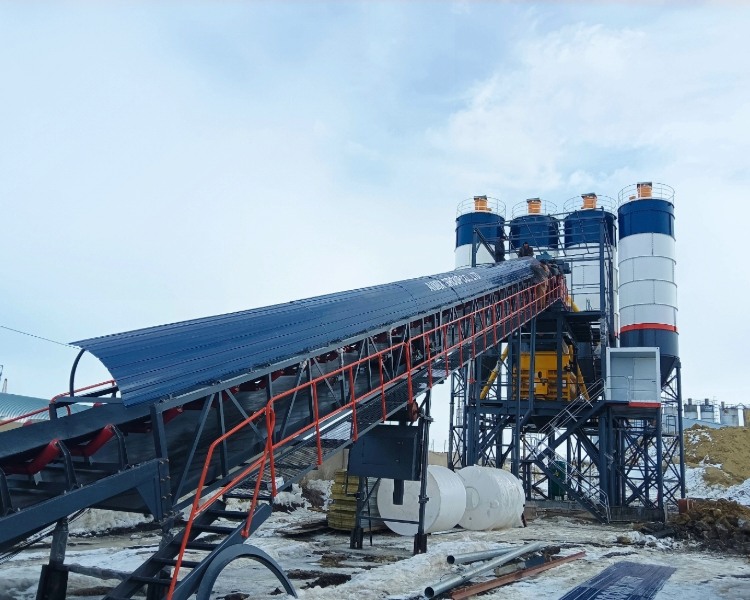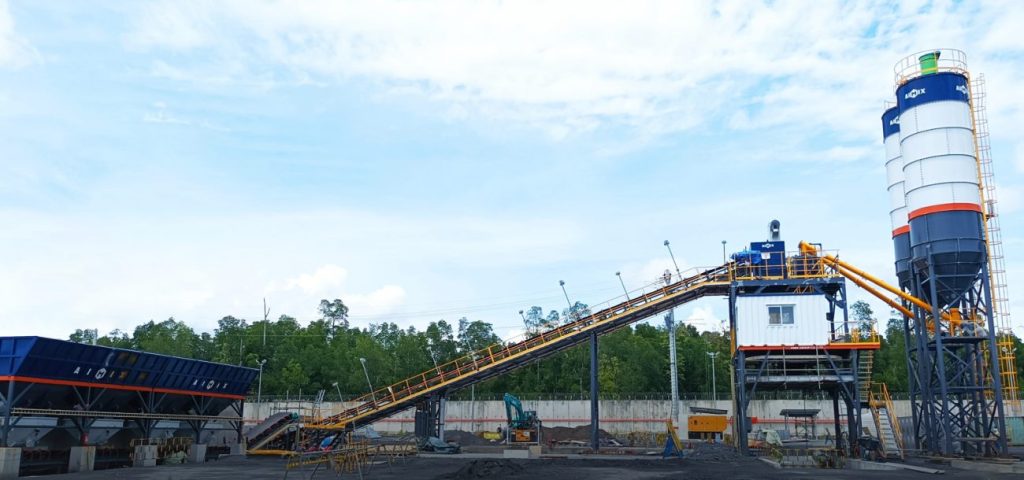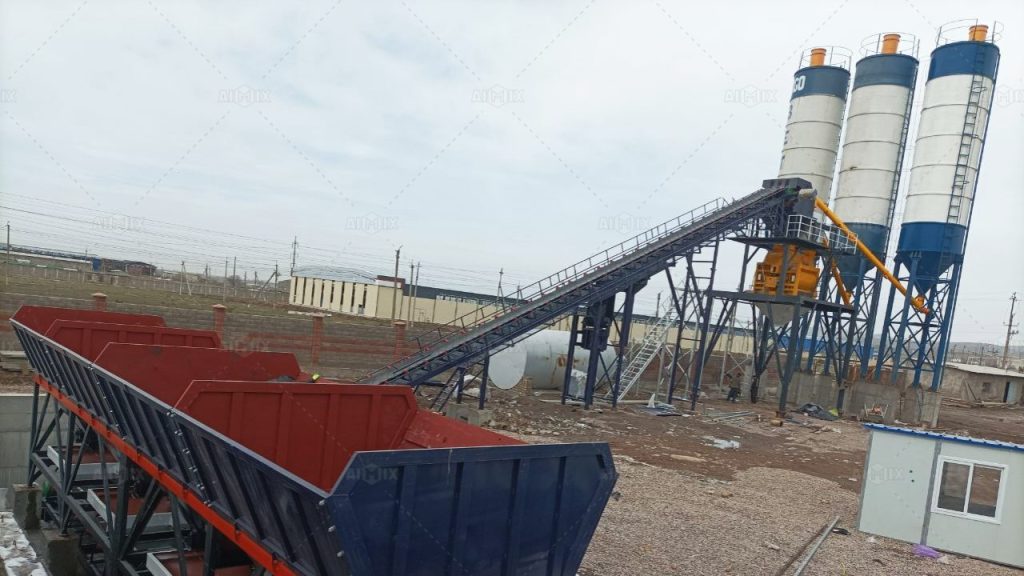In the modern construction industry, environmental sustainability is no longer optional—it is a regulatory necessity and a business advantage. With stricter government policies and a growing demand for green building practices, concrete manufacturers are rethinking their operations. A modern ready mix concrete batching plant is a critical asset in helping companies meet environmental regulations while staying competitive. Equipped with advanced dust control systems, wastewater recycling, and energy-efficient components, these plants align with global sustainability goals.
This article explores how modern batching technologies help meet environmental compliance and what this means for investors evaluating the ready mix concrete plant setup cost, business owners drafting a ready mix concrete plant business plan, and engineers configuring concrete batching mixing plant operations.

Stringent Environmental Regulations in the Concrete Industry
Governments across the globe are tightening environmental standards in construction, particularly around air pollution, water usage, and waste disposal. Compliance typically involves:
-
Dust emission control (especially from cement silos and conveyors)
-
Wastewater treatment and recycling
-
Noise reduction during operation
-
Proper disposal of leftover concrete and materials
-
Minimizing energy consumption and CO₂ emissions
Non-compliance can lead to fines, shutdowns, or denial of permits, which directly affects the operational viability of a ready mix concrete plant business plan. Hence, investing in a technology-forward batching plant becomes a strategic necessity rather than a luxury.
Key Technological Features that Ensure Compliance
Dust Collection and Filtration Systems
Modern ready mix plants are equipped with advanced dust collectors such as bag filters, cyclone separators, and negative pressure vacuum systems. These systems control cement and fly ash emissions at critical points such as cement silos, weighing hoppers, and conveyor belts. By doing so, plants not only protect the environment but also improve worker health and reduce material loss.
Recycled Water Systems
Water is an essential element in the concrete mixing process, but untreated discharge can be harmful. To address this, concrete batching mixing plants now feature closed-loop water recycling systems. These systems collect, treat, and reuse greywater generated from washing mixers and trucks, significantly reducing water consumption and ensuring regulatory compliance.
Noise and Vibration Control
Urban installations must meet municipal noise ordinances. Modern plants now come with low-noise motors, vibration-dampening foundations, and sound-insulated enclosures for mixers and compressors. These innovations help operators obtain construction permits more easily, especially in densely populated zones.
Energy-Efficient Operation
With rising fuel costs and climate commitments, energy efficiency is crucial. Smart batching plants incorporate variable frequency drives (VFDs), solar panels, and automated shut-off systems to reduce energy use. Not only does this support regulatory goals, but it also lowers the total operational cost over the plant’s lifecycle.

How These Technologies Influence Setup and Investment Costs
While eco-friendly technology adds to the ready mix concrete plant setup cost, the long-term ROI is often higher. Here’s why:
-
Lower fines and faster permitting: Plants built to environmental specs are less likely to face delays in licensing or compliance penalties.
-
Reduced resource consumption: Recycled water, optimized energy use, and minimized raw material wastage contribute to long-term savings.
-
Increased marketability: Sustainable construction is a growing trend, and eco-friendly production practices offer a competitive edge when bidding on large infrastructure or government projects.
-
Government incentives: In many regions, eco-compliant plants qualify for subsidies, tax deductions, or carbon credits.
If you’re preparing a ready mix concrete plant business plan, you’ll want to account for the higher initial setup cost but highlight the significant environmental and financial returns.
Integrating Green Features into Your Business Plan
Investors and partners increasingly expect sustainability to be part of any concrete operation’s roadmap. Here’s how to reflect that in your ready mix concrete plant business plan:
-
Environmental Risk Assessment: Identify key environmental impact areas and mitigation strategies.
-
Sustainability Goals: Include targets for water reuse, energy efficiency, and emissions reductions.
-
Compliance Strategy: List relevant local, regional, or international regulations and how the plant meets them.
-
Technology Roadmap: Detail the specific eco-technologies used and their advantages.
-
Cost-Benefit Analysis: Show how eco-friendly technologies, despite a higher ready mix concrete plant setup cost, deliver better ROI and help secure more contracts.

Concrete Batching Mixing Plant Configurations for Environmental Performance
Not all plants are built the same. When selecting a concrete batching mixing plant, you’ll want to choose configurations that support compliance and sustainability:
-
Stationary Plants are ideal for long-term, high-volume operations and can house extensive environmental protection systems.
-
Mobile Concrete Batching Plants offer flexibility and speed of deployment while still incorporating dust suppression and water recycling features.
-
Modular Plants allow future upgrades as regulations evolve, making them a smart investment for changing markets.
In all cases, selecting a reputable concrete batch plant supplier is essential to ensure these environmental technologies are properly integrated and supported.
Conclusion
As environmental regulations in the construction industry become increasingly strict, the need for sustainable operations in concrete production is more urgent than ever. A modern ready mix concrete batching plant equipped with advanced eco-friendly technologies not only ensures compliance but also enhances long-term profitability.
Yes, the ready mix concrete plant setup cost might initially seem higher. However, when viewed through the lens of regulatory safety, resource savings, and market advantage, the investment becomes not only justifiable but necessary. For entrepreneurs drafting a ready mix concrete plant business plan or companies upgrading their concrete batching mixing plant, embracing green technology is the smartest move forward.